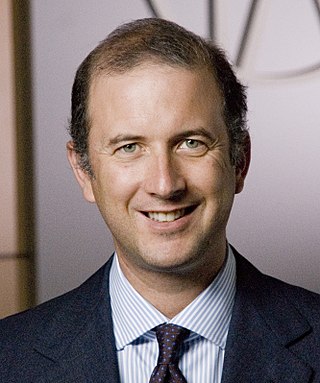
Sonatrach is the national state-owned oil company of Algeria. Founded in 1963, it is known today to be the largest company in Africa with 154 subsidiaries, and often referred as the first African oil "major". In 2021, Sonatrach was the seventh largest gas company in the world.

Eni S.p.A., acronym for and formerly legally known as Ente nazionale idrocarburi, is an Italian multinational energy company headquartered in Rome. It is considered one of the "supermajor" oil companies in the world, with a market capitalization of €50 billion, as of 31 December 2023. The Italian government owns a 30.5% golden share in the company, 1.99% held through the Ministry of Economy and Finance and 28.5% through the Cassa Depositi e Prestiti. The company is a component of the Euro Stoxx 50 stock market index.
Blue Stream is a major trans-Black Sea gas pipeline that carries natural gas to Turkey from Russia. The pipeline has been constructed by the Blue Stream Pipeline B.V., the Netherlands based joint venture of Russian Gazprom and Italian Eni. The Blue Stream Pipeline B.V. is an owner of the subsea section of pipeline, including Beregovaya compressor station, while Gazprom owns and operates the Russian land section of the pipeline and the Turkish land section is owned and operated by the Turkish energy company BOTAŞ. According to Gazprom the pipeline was built with the intent of diversifying Russian gas delivery routes to Turkey and avoiding third countries.
Nord Stream is a pair of offshore natural gas pipelines in Europe that run under the Baltic Sea from Russia to Germany. It consists of the Nord Stream 1 (NS1) pipeline running from Vyborg in northwestern Russia, near Finland, and the Nord Stream 2 (NS2) pipeline running from Ust-Luga in northwestern Russia near Estonia. Both pipelines run to Lubmin in the northeastern German state of Mecklenburg-Vorpommern. Each pipeline contains two pipes, denoted A and B; each of the four pipes is approximately 1,200 kilometres (750 mi) long and with approximate diameters of 1,220 millimetres (48 in). The combined capacity of the four pipes is 110 billion cubic metres per annum of natural gas.
The BBL Pipeline is a natural gas interconnector between the Netherlands and the United Kingdom.

Medgaz is a submarine natural gas pipeline between Algeria and Spain.

Nord Stream AG is a consortium for construction and operation of the Nord Stream 1 submarine pipeline between Vyborg in Russia and Greifswald in Germany. The consortium was incorporated in Zug, Switzerland, on 30 November 2005.

The Trans-Saharan gas pipeline is a planned natural gas pipeline from Nigeria to Algeria. It is seen as an opportunity to diversify the European Union's gas supplies.

The Greenstream pipeline, part of the Western Libyan Gas Project, is a natural gas submarine pipeline running from western Libya to the island of Sicily in Italy.

The Trans-Mediterranean Pipeline is a natural gas pipeline from Algeria via Tunisia to Sicily and thence to mainland Italy. An extension of the TransMed pipeline delivers Algerian gas to Slovenia.

The Maghreb–Europe Gas Pipeline is a natural gas pipeline, which links the Hassi R'Mel gas field in Algeria through Morocco with Cordoba in Andalusia, Spain, where it is connected with the Spanish and Portuguese gas grids. Before the operation of the pipeline ceased in October 2021, it used to supply mainly Spain and Portugal, as well as Morocco with natural gas.

South Stream is a canceled pipeline project to transport natural gas of the Russian Federation through the Black Sea to Bulgaria and through Serbia, Hungary and Slovenia further to Austria. It was never finished.

The Trans Adriatic Pipeline is a natural gas pipeline operational since 2020, running from Greece through Albania and the Adriatic Sea to Italy. It is the final section of the Southern Gas Corridor originating in Azerbaijan. As of 2022, capacity is 10 bcm per year.
Saipem S.p.A. is an Italian multinational oilfield services company and one of the largest in the world. Until 2016 it was a subsidiary of Italian oil and gas supermajor Eni, which retains approximately 30% of Saipem's shares.

Snam S.p.A. is an Italian energy infrastructure company.

The Adriatic LNG terminal is a liquid natural gas offshore terminal, formally known as Terminale GNL Adriatico Srl. Located in the northern Adriatic 9 miles (14 km) offshore of Porto Levante, Porto Viro, near Rovigo, Italy, it is the world's first offshore gravity-based structure LNG regasification terminal. The terminal is operated by ExxonMobil (70%), Qatar Terminal Ltd., a subsidiary of QatarEnergy (23%), and Snam (7%).

Fondi Italiani per le Infrastrutture SGR S.p.A. or, in short form, F2i SGR S.p.A., is Italy's largest independent infrastructure fund manager, with assets under management of approximately €7 billion. It currently manages five funds and one infrastructure Debt Fund.

Marco Alverà is an Italian businessman and Co-founder and CEO of TES since June 2022.

Wintershall Dea GmbH is a German gas and oil producer. The joint venture was created in May 2019 by the merger between Wintershall Holding GmbH and DEA Deutsche Erdoel AG. BASF SE has a 67% stake in it, with the other 33% being held by LetterOne, whose main ultimate owner is the Russian business magnate Mikhail Fridman. As of 2020 it was planning listing on the Frankfurt Stock Exchange.












